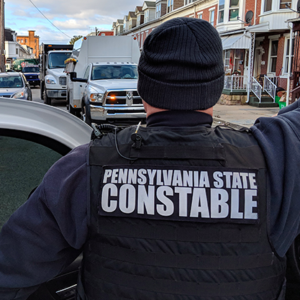We in America have inherited many practices, principles and terminology from our cousins, the British.
One of them is a law enforcement term, “constabulary.” Our constables in Pennsylvania are not the same as the British constable, but the fact we still use that language is interesting.
As someone who has experience in government, politics, and even as a political science professor, I’ve seen where similar terms — such as constable — are often used differently in history and practice.
Almost any time a news article mentions constables in Pennsylvania, such as recently in connection with a pipeline installation, most readers have only a vague understanding of what a constable does. They have the sense that a constable is a part of the court and law enforcement system, but they are not quite sure how they fit in.
Constables play an important role in our state. They are elected officials.
And, as with many of our elected positions, for example Prothonotary, we vote for them while the vast majority of voters have no idea what the job entails. (By the way the Prothonotary of a County is the clerk of the civil cases in the court. Harry Truman once was told he would be introduced in Pittsburgh by a Prothonotary and he asked in Trumanesque style, “What the hell is a Prothonotary?”)
OK back to constables.
One of the roles of a constable is to keep the peace at polling places. You might never notice a constable when you vote, but they are there, making sure our elections are conducted in an orderly manner.
Of course, the main work of constables is delivering court papers. Sheriff deputies often do this work, but there are far more papers to be delivered than the deputies could handle, so constables fill that role. Constables are paid on the basis of each set of papers, so their income may vary from jurisdiction to jurisdiction.
One way constables can supplement their incomes is to rent themselves out as security guards — with their constable badge and peacekeeping training — giving them added credentials. All over the commonwealth, construction companies and other businesses including security firms use constables. As a former county commissioner I saw firsthand how efficient the constable system is.
Last year, the now former district attorney for Chester County brought charges of bribery and conspiracy against the security manager for a pipeline company and some of the constables who were hired to maintain safety protocols along a pipeline construction site.
I’ll leave the interpretation of the law to the judicial system, I do think that, when the rules are properly observed it is common and appropriate for constables being hired for private duty work.
From what we observe, thousands of trained peacekeepers and law enforcement officers often moonlight as private security personnel at restaurants, bars, stores and yes, construction sites. I have even heard that constables are hired for security for COVID-19 clinics!
In this case, the company was taking advantage of an often used method of gaining security by contracting with a subcontractor which, in turn, hired constables.
This activity has been criticized by opponents of the pipeline in an attempt to undermine the entire project, but the practice itself is quite ordinary. If rules were broken, they should certainly be dealt with on the legal basis of constable employment. But it is important to separate them out from the broader pipeline and energy debate which I’m sure will continue to be argued extensively.
This discussion is important, but there is no reason to confuse it by introducing superfluous points.

